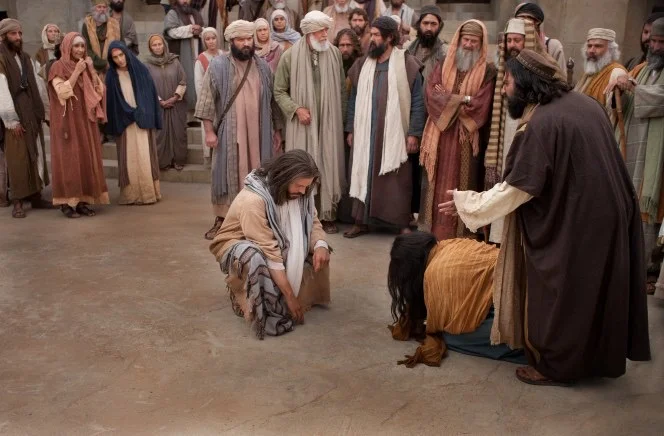Readings for the day: John 7, 8, 9
“Jesus stood up and said to her, "Woman, where are they? Has no one condemned you?" She said, "No one, Lord." And Jesus said, "Neither do I condemn you; go, and from now on sin no more." (John 8:10-11)
We’ve all probably heard the phrase, “Love the sinner, hate the sin.” I don’t know about you but I have not found it all that helpful. First of all, those who do not believe are not convinced they are “sinners” and tend to resent the moniker. Second, it’s really hard to do. Separating one’s behavior from one’s identity is growing more and more difficult in our world. In fact, there are many who would argue it is impossible. And yet Jesus seemed to do it.
The beginning of John 8 is a famous story. Maybe one of the most famous in all of Scripture. And though it’s origin is questionable - it doesn’t appear in the earliest and best manuscripts - it just sounds like Jesus so we tend to keep it in. A woman caught in the very act of adultery is brought before Jesus. The Pharisees and teachers of the law are almost gleeful in their condemnation. They can’t wait to pick up the first stone. They throw her down before Him, pretty convinced He will have mercy which in turn will allow them to accuse Him of breaking the Law. Of course, anyone familiar with the Law can already see the problems. If they caught this woman in the act, where is the man? According to Leviticus 20:10 both parties deserve the death penalty. Perhaps that’s what Jesus is writing in the dust? If they caught her in the act, why have they not carried out her punishment? The Law is clear. Perhaps it’s because they don’t really care about her crime but are far more concerned with trapping Jesus?
Then Jesus does this extraordinary thing. He puts the onus back on them. “Let the one who is without sin cast the first stone.” He hasn’t condemned her nor has He affirmed her. He hasn’t condemned the Pharisees nor has He affirmed them. Instead, Jesus brilliantly lobs the ball back in their court and forces them to make their own decision. The Pharisees put down their stones and slowly walk away. The woman is left all alone, prompting this famous exchange. “Woman, has no one condemned you?” “No one, Lord.” “Nor do I condemn you. Go and sin no more.”
I simply love this about Jesus. He accepts people for who they are but loves them too much to leave them there. He meets us right where we are, takes us by the hand, and leads us to a better place. He accepts us, warts and all, without affirming our sin. To the Pharisee, he says, “Are you really without sin?” To those caught in sin, he says, “I do not condemn you.” And to both, he says, “Go and sin no more.”
As Christians, there is a lot in this world we simply cannot affirm. Changing attitudes in gender and sexuality. Abortion on demand. Racism and sexual abuse. Deceit and falsehood. Anger and hate. These things are not of God and yet so many embrace them. Defend them. Use them as means to a greater end. The answer cannot be rejection. Jesus simply will not allow us to walk away from anyone, including our enemies. So we must find a way - as Jesus found a way - to accept people for who they are without affirming their beliefs, attitudes, or behaviors. Thankfully, this is the heart of the gospel. While we were still sinners, Christ died for us. While we were enemies of God, Christ made peace with us. While we were pushing Him away, Christ embraced us. May the Spirit give us the courage to do the same!
